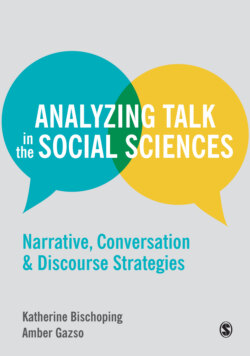Читать книгу Analyzing Talk in the Social Sciences - Katherine Bischoping - Страница 17
На сайте Литреса книга снята с продажи.
The Case of Testimonio
ОглавлениеA specific genre of oral history to which the positivist paradigm fits less than easily is that of testimonio, originating in the Liberation Theology-informed social movements of Latin America. In testimonio, ‘[t]ruth is summoned in the cause of denouncing a present situation of exploitation and oppression or in exorcising and setting aright official history’ (Yúdice, 1991: 17). In this definition, we see that testimonio is decidedly positivist, laying claim to truth with a capital ‘t.’ Readers may be leery of putting this label on testimonio, because positivism and related Enlightenment sciences have been used to promulgate other so-called Truths that now appear repellent, such as racial categorization schemes.
However, Hardt and Negri (2000: 155–6) turn this concern on its head, arguing that Enlightenment means of seeking Truth become quite palatable when they can be put to the ends of justice. This formulation displaces the standpoint of positivism’s knower from one that is objective and neutral to one that is simultaneously objective and avowing an ethical and political position. In one way, this change in standpoint works. When vast ominous silences have been produced by the destruction of (or failure to create) archives, the fabrication of data, or harm to would-be narrators, a positivist faith in incrementally discovering truth by relying on the sources that are most plausible ‘in light of other information’ appears naïve. But, this formulation has built-in contradictions, which come most to the fore when narrators’ testimonies come under close scrutiny. When narrators are speaking to extraordinarily painful experiences, such gentle doubts as we earlier cast on Johanna’s memory of hearing the first shots fired on Poland could well seem heartless, undermining, and unethical. And yet, truth claims in positivism depend on rigorous scrutiny of their bases.
The social sciences’ most famous instance of this conundrum revolves around the testimonio I, Rigoberta Menchú: An Indian woman in Guatemala (Menchú, 1984), in which Menchú depicted herself as an illiterate peasant and eyewitness to the politically motivated murder of two family members during the Guatemalan Civil War. Some years later, after Menchú had become a Nobel Peace laureate, David Stoll (1998), an American political science graduate student, interviewed other Guatemalans who said that Menchú had been attending a Catholic boarding school during these events, and that it was a family conflict that had motivated her father’s murder. A storm of controversy broke out about these discrepancies and several others that Stoll discovered (see Arias, 2001). Many who had been moved by Menchú’s testimonio returned to its first chapter to mull over the passage: ‘My name is Rigoberta Menchú. I am twenty three years old. This is my testimony. I didn’t learn it from a book and I didn’t learn it alone. I’d like to stress that it’s not only my life, it’s also the testimony of my people’ (Menchú, 1984: 1). Some testimonio scholars attempted to defend Menchú, for example, by saying that this passage pointed to a shared authority for the events she had related, and that the work spoke to the truth of others’ lives, if not entirely Menchú’s own. Others, however, felt betrayed and devastated.
The analytic tension that Stoll’s discovery brought to such a breaking point has been manifest in other projects where the stakes are high and the audience extends well beyond the local, such as in the testimonio on the Stolen Generations of Aboriginal children in Australia (Attwood, 2008) or the ‘Comfort Women’ forced into prostitution for Japan’s military during World War II (Kimura, 2008). Can or should a paradigm exist wherein testimonio’s claim to capital-t Truth is sustained without subjecting narrators to positivist-style scrutiny? Your analytic strategy may be to address this tension. Recently, commentators have done so by arguing that narrators should not be conceived of as victims who passively transmit information for historians to judge. Instead, they should be regarded as active political subjects and interpreters in their own right or as people whose political subjectivity, whose self-understandings and self-perceptions as political actors, is being formed by the very process of testifying (see Kennedy, 2006; Kimura, 2008; Uehara, 2007). For example, Choi (2011: 31) describes how a survivor of a Korean War massacre, frustrated by being given only 20 minutes to testify upon her visit to the USA, surprised herself by plucking out her glass eye to make her point.
